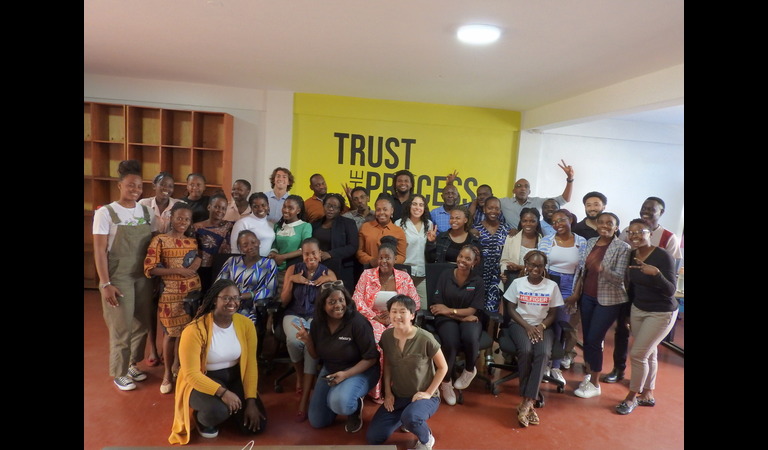HMC and Uganda’s Musizi University Partner on Computer Science Curriculum
April 29, 2025
Through its distinctive Clinic Program, Harvey Mudd College is partnering with Musizi University, Uganda’s first liberal arts university, to design and implement a computing-integrated curriculum for Ugandan students interested in software engineering, healthcare analytics and entrepreneurship.
This is the second year of the collaboration between Harvey Mudd and Musizi, a private college based in northeastern Kampala, Uganda, that was co-founded in 2001 by Claremont McKenna College alumna Takako Mino ’11 and Elaine Alowo Matovu, a Ugandan lawyer and pre-K–12 school founder. With over 50% of its population younger than 18 and 87% of university graduates unemployed after graduation, Uganda has a need for accessible educational institutions. Musizi seeks to fill this gap and aims to prepare students to lead, build and manage companies and teams.
The university’s curriculum is inspired by liberal arts colleges like Harvey Mudd and emphasizes interdisciplinary learning and critical thinking. Mino was familiar with HMC’s Clinic Program—which matches organizations with student teams to find solutions to real-world, technical problems—and connected the two institutions.
During the first year of the Clinic project, the HMC student team worked with Musizi faculty and students to design materials for six first-year courses in Musizi’s undergraduate software engineering major, including Computational Thinking, Math for Computing, Python, Generative AI, Uganda Studies, and Obuntu Bulamu Philosophy.
The 2024–2025 team, HMC’s Isabelle Ancajas ‘25, Jonathon Roberts ’25 and Vicente Valdes ’25, CMC’s Andre Nesbit ‘25, and Scripps’ Ariel Heimanson ‘25,has developed an optional track of classes for software engineering students who want to learn more about AI and machine learning. The four classes they developed span the first two years of Musizi’s software engineering bachelor’s track: Software Engineering Careers Seminar, Data Analytics and Visualization, Software Engineering I, and Software Engineering II.
The Harvey Mudd Clinic team traveled to Uganda in January 2025 to present a one-day workshop to students and faculty members. Harvey Mudd computer science professor and Clinic advisor Julie Medero noted that Musizi students traveled from all over Uganda to attend the workshop, which included:
- A pilot class on software engineering careers, where attendees explored industry opportunities and brainstormed tech solutions.
- One-on-one mentorship for high school students and personal statement writing for college applications.
- A student debate competition, where participants discussed the impact of foreign aid, banning street vending, and labor conditions for Ugandans working abroad.
Clinic team lead Vicente Valdes Pineda ’25 traveled to Uganda and has enjoyed getting to know and working with students in Uganda. “We’ve been co-developing these software engineering courses by first identifying the general things the students need,” Valdes Pineda says. “Then, we work with the students to come up with learning objectives and conceptualizing into a structured class. A final assessment measures those objectives. Then, we fill in the gaps wherever needed.
Valdes Pineda and the other team members also developed a pilot class to teach students about software engineering and its many societal applications.
Medero sees this project as more than just curriculum development for a university whose mission is to “prepare ethical, entrepreneurial and employable leaders.” She and HMC Clinic students are refining coursework and integrating faculty and student feedback to help ensure the curriculum remains relevant to Uganda’s job market and is engaging to Ugandan students.
Of the partnership between Harvey Mudd and Musizi, Medero says that it “is a great opportunity for us to learn from each other in ways that will improve the way we teach computing at both institutions.”
Musizi is seeking accreditation for its curriculum and is hoping to welcome its first class of students within the next two years.
